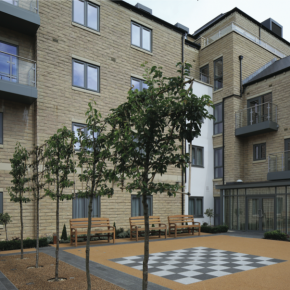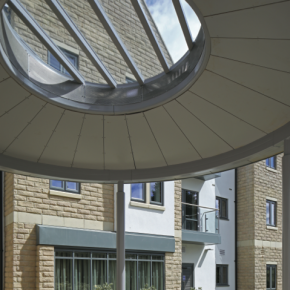
Glazing that goes the extra mile
Our health and sense of wellbeing are inextricably linked to our physical surroundings and ensuring the correct balance between aesthetics, comfort, efficiency and value present a key challenge for specifiers working in the healthcare sector. Paul Coley, architectural advisor with fenestration manufacturer, Senior Architectural Systems, looks at the role that glazing systems have to play in the creation of the new generation of Extra Care schemes that offer a modern alternative to traditional residential care homes for older people, in the latest issue of ABC&D magazine.
 With today’s aging population, it has never been more important to address the care needs of older people and the growing Extra Care housing market aims to do just that. Unlike traditional residential care homes, Extra Care schemes offer older people the opportunity to receive care while maintaining a degree of independence by residing in self- contained properties. Developments can vary from being blocks of flats, bungalow estates or retirement villages but all include important communal facilities and provide the required level of domestic support and personal care on site. Residents essentially have their own homes, with access to their own front doors and a legal right to occupy the property.
With today’s aging population, it has never been more important to address the care needs of older people and the growing Extra Care housing market aims to do just that. Unlike traditional residential care homes, Extra Care schemes offer older people the opportunity to receive care while maintaining a degree of independence by residing in self- contained properties. Developments can vary from being blocks of flats, bungalow estates or retirement villages but all include important communal facilities and provide the required level of domestic support and personal care on site. Residents essentially have their own homes, with access to their own front doors and a legal right to occupy the property.
Designed with care
As such, the core design principles for Extra Care schemes is that they must be domestic in style and designed to a level that creates a sense of pride and ownership with the residents. The facilities obviously must be comfortable to resid ein but the building also ust be cost-effective and efficient to runa nd maintain. Increasingly, such schemes are also subject to stringent sustainability targets.
The sector also presents a unique set of design requirements in terms of the way the look and feel of the building can positively contribute to the care and wellbeing of the residents. In particular, the project team must ensure that the design of the building responds to the needs of people who have visual, hearing or cognitive impairements.
Aesthetic appeal
Like any residential scheme, Extra Care homes are required to offer a degree of kerb appeal but the design of the external building envelope is also key to creating inspirational interiors. The use of natural light is well-known for its health benefits and, as such, the design of the fenestration system is vitally important. The inherent strength of aluminium allows larger expanses of glazing to be safely accommodated in a much slimmer frame and so the use of aluminium windows, doors and curtain walling can maximise the flow of natural light and offer greater views of the outside garden areas.
Lighting the way
The design flexibility of aluminium fenestration systems can also help assist with wayfinding, which is an importanct consideration in terms of creating homes that are appropriate for people with demetia or visual impairements. Creating colour contrast between doors, door frames and walls can be easily achieved by powder-coating the aluminium frames and, as the colour options are almost limtiless, interior décor schemes can be easily complemented. The positioning of windows is also important to ensuring the interior space is well-lit and,a long with the use of roof lights, can be an effective way to soften the appearance of long corridors.
Benefits built-in
The comfort of the residents is paramount and, as such, so is the thermal efficiency of the building envelope. Specifying high performance aluminium windows, doors and curtain walling systems that offer low U-values is a cost-effective way to reduce heating costs and help maintain a pleasant internal environment. The acoustic performance is equally important, particularly as long-term reverberation noise can have a detrimental effect on people with hearing impairements.
Not only do the environmentally friendly characteristics of aluminium help to improve carbon calculations and meet sustainability targets but aluminium systems can also help reduce cyclical maintenance costs by offering exceptional durability.
Although designed to be domestic in style, the stringent requirements of the healthcare sector are still very much at play in the residential Extra Carehome market and early engagement and collaboration with the supply chain can make all the difference in ensuring the most appropriate products and building techniques are specified.
Latest news

28th March 2025
Ideal Heating Commercial announces 10-year warranty on Evomax 2 boiler
Evomax 2, the UK’s number one selling commercial wall-mounted boiler from Ideal Heating Commercial, is now available with a 10-year warranty.
Posted in Articles, Building Industry News, Building Products & Structures, Building Regulations & Accreditations, Building Services, Facility Management & Building Services, Heating Systems, Controls and Management, Heating, Ventilation and Air Conditioning - HVAC, Innovations & New Products, Pipes, Pipes & Fittings, Plumbing, Retrofit & Renovation, Sustainability & Energy Efficiency, Videos
28th March 2025
FLIR Si1-LD Acoustic Imaging Camera for Compressed Air Leak Detection
FLIR, a Teledyne Technologies company, introduces the Si1-LD, an industrial acoustic imaging camera that brings faster and more accurate compressed air leak detection to those operating on a modest condition monitoring budget.
Posted in Acoustics, Noise & Vibration Control, Articles, Building Industry News, Building Products & Structures, Building Services, Facility Management & Building Services, Information Technology, Innovations & New Products, Retrofit & Renovation, Sustainability & Energy Efficiency, Thermal Imaging and Monitors
28th March 2025
LIFTEX 2025 Seminar programme announced
Registration has opened for LIFTEX 2025. Now in its 37th year, LIFTEX 2025 is the UK’s only dedicated exhibition for the lift, escalator and access industry and takes place only once every three years.
Posted in Access Control & Door Entry Systems, Accessibility, Articles, Building Industry Events, Building Industry News, Building Products & Structures, Building Regulations & Accreditations, Building Services, Exhibitions and Conferences, Facility Management & Building Services, Health & Safety, Retrofit & Renovation, Security and Fire Protection, Seminars
28th March 2025
MCRMA welcomes ArcelorMittal UK to membership
A UK division of the global steelmaking business ArcelorMittal has become the latest new member of the MCRMA, the industry association representing the metal building envelope sector.
Posted in Articles, Building Associations & Institutes, Building Industry News, Building Products & Structures, Building Systems, Cladding, Facades, Posts, Restoration & Refurbishment, Retrofit & Renovation, Roofs, Steel and Structural Frames, Walls
 Sign up:
Sign up: